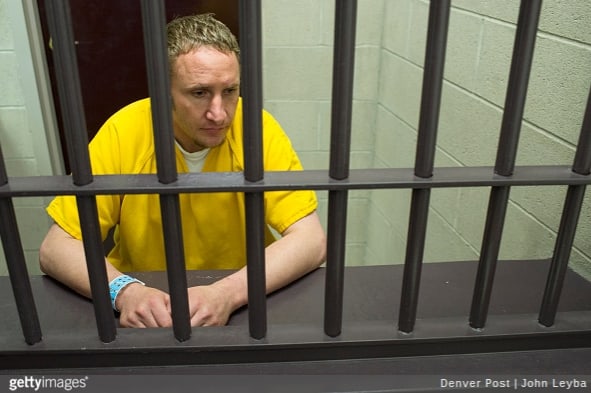“Yeah, you know, it’s just like what Hegel says, right?” Wait, what? I run a mental checklist: Am I still in San Quentin?1 Yep. Did I just hear Georg Wilhelm Friedrich Hegel name-checked by a tattooed man wearing a state-issued jumpsuit? Yep.
Huh. I guess the inmates of San Quentin continue to surprise.
***
Getting a mid-day philosophy lesson from a man in blue — only new prisoners yet to be permanently assigned to a cell block wear the orange popularized by Netflix — was a surprise, but I knew enough by then that it wasn’t as strange as I may have thought at one time.
I had been volunteering at San Quentin for over a year and saw that one of the fixtures of the prison was the large library and education building. Many of the inmates had spoken to me about the Prison University Project and the college correspondence courses they had participated in.2 And one of the harsh realities of prison life is that one has lots of time at one’s disposal and not much to fill it with. Books, teachers, time… all the makings of a hard-core philosopher right there.3
So, after I got over the initial surprise, it made total sense that I should be thrust suddenly into a conversation about Hegel. It was just another moment where I had to be reminded of the normalcy of the men who were here imprisoned at San Quentin.
***
Our society does not encourage us to see the normalcy of prisoners. At best, they are shrouded in mystery. For many people, prison is the ultimate black box. They have never been inside, they have no idea how it works, and they associate it with a sense of indeterminate danger.
This lack of experience is then reinforced by other factors. Most often, prisons are placed far away from major urban centers, limiting the amount that people can visit even if they want to.4 We are not encouraged to think at all of the 2.4 million men and women currently incarcerated in our country.
This neglect is tragic, but it certainly is preferable to the second most common attitude toward prisoners. When they are thought of, prisoners are commonly viewed as a moral blight on our land, a threat to good, law-abiding citizens (like us), someone who deserves anything that comes their way—in a word, scum. Prisoners are the ultimate “throw-away people.”
It is safe to revile prisoners, to look down on them, to get angry at them, to remove their rights, to deny them anything, to say anything one wants. We know that they won’t be showing up in our conversation anytime soon asking for their rights or our respect. We won’t have to look them in the eye the next morning.
But it is also safe to do these things because they are “criminals.” This label excuses all because, in the minds of many, it makes someone permanently other.
In this way, we make prisoners our modern scapegoat. We take a particular segment of the population, the criminal, and cast all our wrongs on them and drive them out of the community. By making them something other than us, this does something for me as well. If they are criminals and they are evil, then I can show that I am not. I can’t be scum, because all the scum are corralled in an institution in the desert wearing blue. I am a “law-abiding citizen.”5
Nor does the scapegoating of prisoners end with negative attitudes. It has real impacts on those we treat this way.
Take, for example, the right to vote. For most of my life, I didn’t think much of the fact that in 48 of 50 states, people imprisoned for a felony lose their right to vote, and many of them remain off the voting register even after their sentence. It might seem fitting that there would be some real consequences to breaking a serious law. But, of course, not all felonies are equal. Murder and the possession of seven-tenths of an ounce of marijuana both trigger the same loss of civil rights in the state of Florida.
This takes an even more disturbing turn when placed in the context of the racial disparities present in the War on Drugs. Despite higher rates of drug use among white Americans, black Americans are arrested for drug crimes three times as often and comprise over 40 percent of those incarcerated for drugs. In the context of these discrepancies, denying prisoners the right to vote has enormous civil rights implications that have led some to describe our prison system as “the new Jim Crow.”
This legalized discrimination exists on an economic level, too. It’s perfectly legal for employers to require job applicants to disclose previous criminal convictions and to discriminate against ex-felons in hiring.
Public housing and welfare programs are similarly closed to felons. When prisoners are released, they are told to become productive members of society in the absence of fair access to employment or any chance at public assistance for feeding or housing themselves.
The deck is stacked against them.
These and countless other harsh realities—overcrowding, eternal solitary, the death penalty—point to a systematic dehumanization of prisoners by our society. They can be thrown away and forgotten about as if we did not have any human obligation to them at all.
Of course, this can be a delicate line to tread. Justice demands that we not forget the victims of crime either. Correction, even firm and unyielding correction when appropriate, must be applied; physical and social isolation will likely always be a part of that.
Most of the men in San Quentin knew that themselves. They knew that they owed a debt that they could never repay.
Every week during the petitions at Sunday mass, I would listen for the prayers of “Alex.” Amidst prayers for families, friends, and world events, I could always count on hearing his voice pipe up and pray the same prayer each week: “I pray for the victims of my crime and for all the victims of crime.”
He knows that this prayer does not make everything all better and that he can’t wave his hands and make his past go away. Yet every time I heard that prayer, I heard the unstated desires that went along with it. The desire not to be captive to his past and to make restitution in the weekly — even daily — commitment to a different way of life.
So am I suggesting that we throw open the prison doors and let everyone go free? Hardly. In addition to holding amateur philosophers and lawyers, San Quentin has many who are professional con men and bullies. Many who are a danger to others and even to themselves. These men in blue are not saints. But they are not scum, either. They are human beings. They are human beings trying to make their way in the world — often a world far more violent and disturbing than any I have had to deal with.
***
One day “Sandro” came up to me after mass and told me, “I grew up in a scary place, and I was always afraid. I figured that the one way I could make sure nobody messed with me was to make sure that I was always the craziest guy on the block. If they were afraid of me, then maybe I didn’t have to be afraid of them.”
By the time I knew him, decades into his sentence, it was hard to believe these words. He was one of the nicest, cheeriest guys I knew, in or outside the walls. But I believed him when he said that that growth came from a ground fertilized with lots of pain and real transgressions.
Sandro is free now, allowed to leave because of sentencing reform that has slowly spread through the California prison system after a federal judge ruled that the degree of overcrowding there was unconstitutional.
If you passed Sandro on the street, you might notice a few more tattoos than is usual or a bit more robust facial hair than the norm, but you also might not notice anything different at all. That is because he is a human being: flawed, imperfect, yet also graced and gracious.
In short, he is just like you and me.
- Thanks to Johnny Cash, San Quentin is one of two California State Prisons with international name recognition. ↩
- Unfortunately, these programs are out of reach of many prisoners across the country. Despite the usefulness of continuing education in preventing recidivism, for the past two decades, inmates have been unable to receive the federal Pell grants that would make it affordable. ↩
- Honestly, though, only a few choose to apply themselves to philosophy. The study of law, on the other hand, has a far more universal appeal. Almost every inmate with a long-term sentence that I talked to was an expert on the finer points of law regarding their conviction and the penal system in general. ↩
- And, in many high-security institutions, these physical limitations are reinforced by extreme administrative restrictions that can even prevent 60 Minutes from seeing what is inside them. ↩
- Of course, what we tend to forget is that “law-abiding” is actually a value judgment. When I say this, I am not making a claim about whether I actually obey the law… I can run red lights, fudge on my taxes, and sneak a 4 oz. tube of toothpaste onto airplanes all day without ceasing to be “law-abiding” in the relevant sense. I am law-abiding mostly because I am not one of them. ↩


